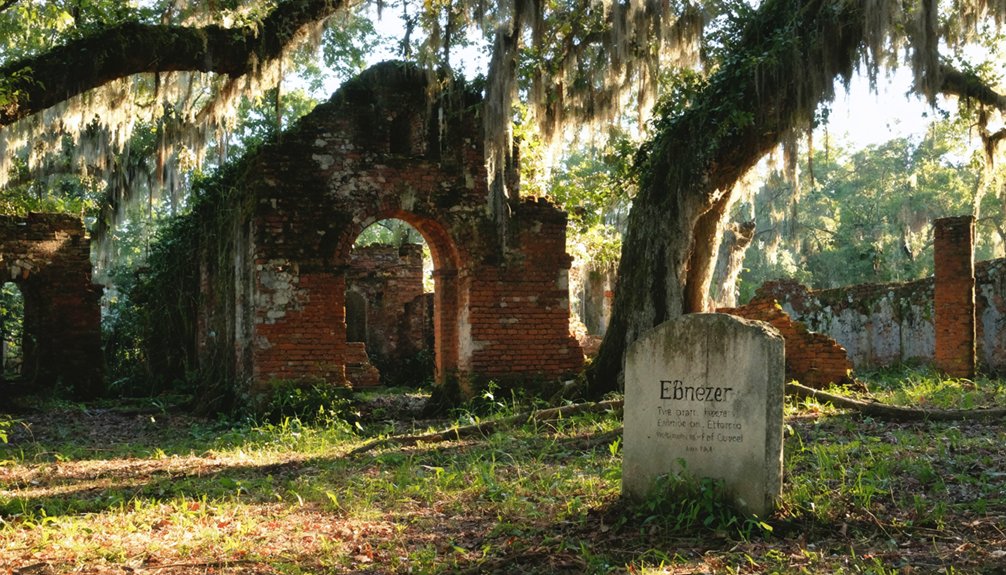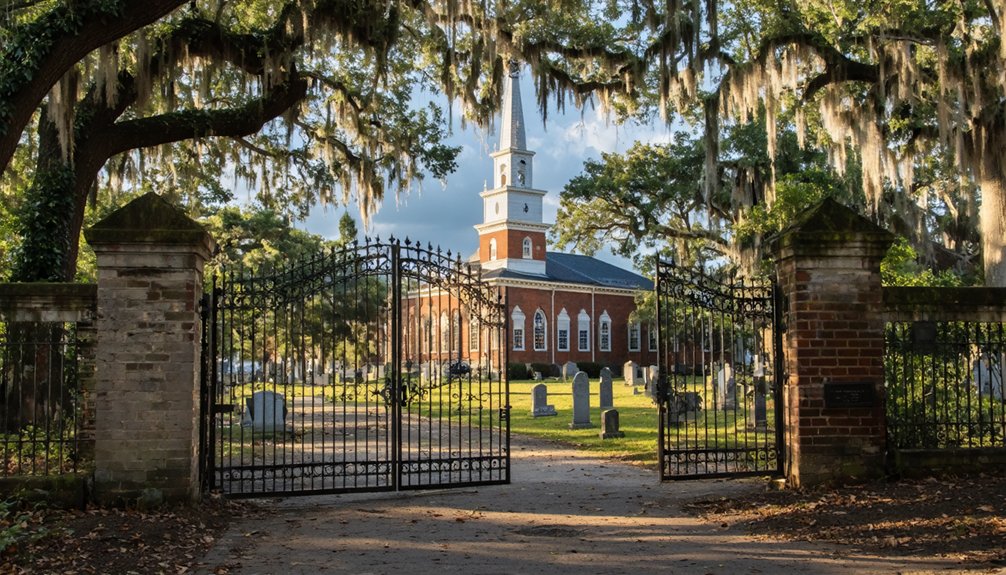You’ll find Ebenezer, Georgia’s rich history in its ghostly remains, where German-Protestant Salzburgers established a thriving religious community in 1734, 25 miles north of Savannah. Under Pastor Boltzius’s leadership, they built water-powered mills, homes on cypress stumps, and the still-standing Jerusalem Lutheran Church. Though British forces during the Revolutionary War led to the town’s decline, today’s archaeological sites and preserved structures reveal countless stories of religious freedom, innovation, and perseverance.
Key Takeaways
- Ebenezer, Georgia, established in 1734 by Salzburg Protestant refugees, is now a ghost town 25 miles north of Savannah.
- The Jerusalem Lutheran Church, one of America’s oldest Lutheran congregations, remains the town’s most prominent surviving structure.
- British occupation during the Revolutionary War in 1778 led to widespread plundering and community displacement, initiating the town’s decline.
- Archaeological surveys have identified 108 distinct historical sites spanning from Paleo-Indian to colonial periods within the ghost town.
- The historic townsite is listed on the National Register of Historic Places and offers ghost town tourism opportunities.
Religious Roots and Protestant Persecution
While religious persecution in 18th-century Europe forced many Protestant groups to seek refuge elsewhere, the Salzburgers’ expulsion from their Austrian homeland led to the establishment of Ebenezer, Georgia. In 1731-1732, approximately 20,000 Protestants were driven from the Archbishopric of Salzburg, finding sanctuary in the British colony of Georgia under the spiritual guidance of Pastor Johann Martin Boltzius.
The settlement’s Pietist influence shaped Ebenezer into a tightly-knit religious refuge, where community members emphasized spiritual purity and cooperation. Pastor Boltzius directed the community through his vision of religious exile and redemption.
Pietism’s core values created a close-knit sanctuary at Ebenezer, where faith and mutual support defined daily life.
With support from the Francke Foundations and the Society for the Promotion of Christian Knowledge, you’ll find that Ebenezer flourished as a haven for persecuted faiths, including Moravians.
The Jerusalem Lutheran Church, established by these resilient settlers, stands today as one of America’s oldest Lutheran congregations. After Boltzius’s death in 1765, the Salzburger traditions faded as the community gradually assimilated into the broader society.
The Journey to Colonial Georgia
Although Spanish explorers had ventured through Georgia’s coastal regions since the mid-1500s, it wasn’t until James Edward Oglethorpe‘s vision in 1730 that permanent European settlement took root.
After receiving King George II’s charter in 1732, Oglethorpe led 114 brave colonists aboard the Anne toward a new life of freedom in America.
You’ll find the settlers’ success hinged on vital Native relations, particularly with Chief Tomochichi of the Yamacraw tribe and translator Mary Musgrove, who bridged cultural divides.
Upon reaching Yamacraw Bluff in February 1733, Oglethorpe strategically chose this location to establish Savannah, designing it with a modern grid layout. The colony initially operated under strict rules that included a ban on slavery.
While Spanish missions and failed settlements had dotted the coast previously, this time European exploration would yield lasting results through diplomatic negotiations and carefully planned development. In 1739, Oglethorpe strengthened relations with Native Americans by signing the Treaty of Coweta Town with Creek chiefs.
Building a New Settlement
As you explore Ebenezer’s early development, you’ll find the Salzburger settlers carefully planned their new community’s layout around essential structures like mills, homes, and the Jerusalem Lutheran Church.
You can trace how these German Protestant refugees applied their European construction methods, using local materials to build sturdy structures that could withstand Georgia’s climate.
The settlers’ organized approach to town planning reflected both their cultural values and practical needs, establishing infrastructure that would serve their growing community’s religious, economic, and social requirements. Their industrious nature led them to create the first water-driven mill in colonial Georgia, demonstrating their technological innovation.
Under the leadership of Pastor Johann Bolzius, the community established itself on a high bluff where the Savannah River met Ebenezer Creek, providing better conditions than their first settlement location.
Initial Layout Planning
When the Salzburgers first established Ebenezer in 1734, they carefully selected a location 25 miles north of Savannah at the intersection of Ebenezer and Little Ebenezer creeks. The settlement layout prioritized religious freedom and community gathering spaces, with the town’s infrastructure designed around future homes and shared areas.
You’ll find that General Oglethorpe chose this inland location to respect Native American treaties while ensuring the settlement’s accessibility by boat. The 150 Salzburger refugees arrived seeking sanctuary from religious persecution in their homeland.
The community planning focused on creating a self-sustaining settlement where religious and communal activities could flourish. The settlers constructed the first school in Georgia, providing education for nine students. While the Salzburgers initially concentrated on establishing their religious foundation, they’d later develop economic ventures like silk mills.
However, environmental challenges at the original site would ultimately lead them to relocate closer to the Savannah River in 1736 for better trading opportunities.
Salzburger Construction Methods
The Salzburgers’ ingenuity in construction shines through their adaptive building methods at Ebenezer.
The community of Swiss and Palatine settlers joined in strengthening the construction efforts. You’ll find their architectural adaptations perfectly suited to the swampy terrain, with houses elevated on cypress stump piers to combat flooding and moisture. They’ve mastered sustainable practices by utilizing local materials, constructing chimneys from mud and sticks, and primarily building with wood from nearby forests.
Their construction materials and Salzburger techniques reflect remarkable community resilience. You can trace their progress from simple log huts to more sophisticated frame houses, all while facing significant environmental challenges. Under Pastor Boltzius’s leadership, the settlers established Jerusalem Church as their spiritual center.
Water-driven mills became essential to their success, processing lumber and supporting their expanding settlement. Through communal building efforts, they’ve created lasting structures, including the Jerusalem Church, which stands as a symbol of their architectural ingenuity and determination.
Daily Life in Early Ebenezer
You’ll find that daily life in early Ebenezer revolved around a tight-knit Lutheran community, where Pastor Boltzius provided spiritual and practical leadership for the Salzburger refugees.
Your days would have been filled with agricultural labor, including work at the water-driven grist mill and silk filature, while maintaining strong Germanic cultural traditions.
The community’s religious devotion shaped every aspect of life, from attending the Jerusalem Evangelical Lutheran Church to participating in Georgia’s first Sunday School and supporting the local orphanage.
Religious Community Structure
At the heart of early Ebenezer’s social fabric stood Pastor Johann Martin Boltzius, who served as both civil and ecclesiastical leader while shaping the settlement’s religious utopian vision.
Through strict church discipline, you’d find a community deeply committed to maintaining moral purity and spiritual well-being. The Jerusalem Evangelical Lutheran Church, built between 1767-1769, became the center of communal life, hosting weekly services and even serving as a hospital during the Revolutionary War.
You’d notice how religious observances influenced every aspect of daily life, from work patterns to social gatherings. The community’s values reflected in their initial resistance to slavery and emphasis on collective welfare over individual wealth.
Through communion rituals and religious festivities, you’d experience a tightly-knit community where social cohesion stemmed directly from shared faith and traditions.
Farm and Mill Work
Life in early Ebenezer revolved around three primary economic activities: farming, milling, and silk production. You’d find families working together on small plots of land, practicing sustainable agriculture without slave labor – a stark contrast to neighboring plantations. The community’s commitment to freedom shaped their economic model.
When you’d visit the settlement’s water-driven gristmills, built in 1740 and 1751, you’d see grain processing in full swing. The community’s innovative spirit showed in their silk filature, where widows and orphans worked together reeling silk from cocoons.
Timber operations and sawmills added to the economic diversity, while community labor kept everything running. Though this model eventually struggled against slave-based economies, it demonstrated how a free society could function through shared work and mutual support.
Germanic Cultural Traditions
While Pastor Johann Martin Boltzius guided Ebenezer’s spiritual direction, Germanic traditions shaped every aspect of daily life in this Lutheran settlement.
You’d find strong cultural preservation efforts throughout the community, where German remained the primary language of daily communication. The settlement’s layout reflected Germanic planning principles, with orderly streets and systematically arranged houses demonstrating their disciplined approach to community organization.
Your daily life would’ve centered around Lutheran religious practices, with the Jerusalem Lutheran Church serving as both a spiritual and social hub.
The community’s linguistic heritage helped strengthen bonds between existing settlers and newly arriving Germanic refugees. You’d notice Biblical names like Zion, Bethany, and Goshen marking the satellite communities, while shared values of piety, modesty, and anti-slavery sentiments unified the settlement’s identity.
Economic Ventures and Challenges
Founded as a haven for Salzburger refugees in 1734, Ebenezer’s early economy centered on small-scale farming and innovative ventures that set it apart from other colonial settlements.
You’ll find that the settlers pursued economic sustainability through diversified agriculture, growing staples like corn and beans while establishing significant silk production operations. Their trade relations extended to Native American communities, creating essential economic connections beyond their immediate borders.
Despite early success, you can trace Ebenezer’s eventual decline to mounting challenges.
The community’s resistance to slavery initially preserved their social fabric but made competition difficult when surrounding plantations adopted slave labor after 1750.
While their silk industry peaked in 1766, market changes and increased competition from plantation agriculture ultimately undermined their small-farm model, leading to the community’s gradual economic transformation.
Impact of the Revolutionary War

You’ll find that Ebenezer’s strategic location made it an essential military target during the Revolutionary War, with both British and American forces repeatedly vying for control of the town.
The British occupation in 1778 proved especially devastating, as troops plundered homes, used buildings for cannon practice, and converted the Jerusalem Church into a hospital and stable.
The military disruption shattered the town’s tight-knit Salzburger community, forcing many residents to permanently abandon their properties and seek refuge elsewhere.
Military Impact on Community
Due to its strategic location between Augusta and Savannah, Ebenezer endured dramatic upheaval during the American Revolution, as the town changed hands multiple times between British and Continental forces.
Military strategies from both sides transformed this peaceful settlement into a fortified position, with the Continentals establishing defenses in 1776 and the British adding redoubts after capturing it in 1779.
You’ll find that these military occupations severely tested the community’s resilience, as residents faced displacement, economic hardship, and the erosion of their social fabric.
The once-thriving Salzburger population scattered in search of safety, and the town’s signature silk production industry collapsed.
While the Jerusalem Evangelical Lutheran Church still stands as a monument to their perseverance, the war’s impact ultimately led to Ebenezer’s decline.
British Occupation and Destruction
The British invasion of Ebenezer marked a devastating chapter in the town’s history when Colonel Archibald Campbell‘s forces captured the settlement on January 2, 1779.
You’ll find that the British quickly established their dominance by constructing extensive fortifications and redoubts, recognizing Ebenezer’s strategic importance in defending Savannah.
The occupation proved catastrophic for the community’s fabric. British forces transformed the Jerusalem Church into a stable and hospital while using local homes for cannon practice.
Many Salzburgers fled, abandoning their properties and livelihoods. This mass exodus, combined with widespread destruction, triggered a severe economic decline that the town couldn’t overcome.
The Town’s Gradual Disappearance
Once a promising settlement of Salzburger refugees, Ebenezer’s decline unfolded through a perfect storm of challenges that gradually eroded its significance.
You can trace the town’s disappearance through dramatic demographic changes, as Salzburgers left in search of better opportunities, leaving behind an aging population that couldn’t sustain the community’s liveliness.
The economic decline hit particularly hard, with failed silk operations and limited trade options due to the town’s isolation.
Economic isolation and failed silk ventures proved devastating, marking a turning point in Ebenezer’s downward spiral.
Without a diverse economic foundation, you’d have seen the town struggle to maintain basic infrastructure and services.
The combination of disease outbreaks in the swampy environment, lack of skilled labor, and insufficient resources ultimately sealed Ebenezer’s fate.
Today, only the Jerusalem Church and historical markers remain to tell the story of this once-thriving colonial settlement.
Jerusalem Lutheran Church Legacy

Among the remnants of Ebenezer’s colonial past, Jerusalem Lutheran Church stands as a powerful symbol of religious perseverance and cultural heritage.
You’ll find America’s oldest continuously operating Lutheran congregation here, worshiping in the same brick building since 1769. The church’s 21-inch-thick walls, handmade from local clay, still bear the fingerprints of colonial craftsmen.
As a reflection of community resilience, the congregation has maintained its traditions through wars, social changes, and the town’s decline.
Today, with 450 members, you can experience weekly services, just as the Salzburger settlers did centuries ago. The church’s legacy lives on through its active Sunday School, continuing the educational mission that began as Georgia’s first in 1734.
Archaeological Discoveries and Preservation
Since its discovery through extensive archaeological surveys, Ebenezer’s rich historical tapestry has revealed 108 distinct sites spanning from Paleo-Indian to colonial periods.
You’ll find that contrary to earlier beliefs, this area was a hub of prehistoric activity, particularly in the inland coastal pine barrens, showcasing its archaeological significance.
The LAMAR Institute’s ongoing preservation efforts have uncovered:
- Extensive artifact collections now housed at the University of Georgia
- Evidence of continuous human occupation spanning thousands of years
- Detailed excavation records documenting settlement patterns
- Previously unknown aboriginal resource utilization sites
Today, you can witness these preservation challenges firsthand as local communities work alongside researchers to protect Ebenezer’s legacy, including the historic townsite and Jerusalem Lutheran Church, both listed on the National Register of Historic Places.
Modern-Day Ghost Town Tourism

Building upon Ebenezer’s rich archaeological heritage, modern ghost town tourism has transformed this historic site into a compelling destination for history enthusiasts and cultural explorers.
You’ll find that ghost tourism here follows successful models seen in places like Bodie, California, focusing on preserving authentic structures while creating engaging visitor experiences.
The site’s economic revitalization efforts have centered on sustainable tourism practices, with local community members actively participating in preservation initiatives.
You can explore well-maintained historical structures while supporting the area’s development through guided tours, educational programs, and cultural events.
Like other successful ghost towns, Ebenezer balances tourism growth with environmental protection, ensuring that you’ll experience both its fascinating history and natural beauty while contributing to its ongoing preservation.
Frequently Asked Questions
Are There Any Reported Ghost Sightings or Paranormal Activity in Ebenezer?
You’ll find ghostly encounters primarily around Ebenezer Creek, where locals report hearing anguished cries and spectral sightings, especially during rainfall. The ghost town itself has fewer documented paranormal activities.
What Happened to the Original Salzburger Families’ Descendants?
You’ll find Salzburger descendants throughout Georgia and beyond, as their family migration patterns led them to establish new communities while maintaining their descendant legacy through genealogical societies and cultural traditions.
Can Visitors Access the Original Silk Production Facilities Today?
You can’t visit the original silk production facilities today as they no longer exist. While you’ll find historical markers documenting the silk history, all physical structures have been lost to time.
Were There Any Notable Natural Disasters That Contributed to Ebenezer’s Decline?
You won’t find records of major flood damage or fire destruction contributing to Ebenezer’s decline. Historical documents point to human factors like the Revolutionary War and economic challenges as the main causes.
What Native American Tribes Lived in the Area Before Ebenezer’s Settlement?
You’ll find that Creek heritage dominated the area, with their confederacy controlling most of Georgia’s land before European settlement, while Cherokee history shows their presence primarily in northern Georgia regions.
References
- https://www.effinghamherald.net/lifestyle/echoes-of-effingham/gone-but-not-forgotten-old-ebenezer/
- https://www.georgiaencyclopedia.org/articles/history-archaeology/ebenezer/
- https://www.georgiahistory.com/marker-monday-old-ebenezer/
- https://www.youtube.com/watch?v=Qjwhs7lvBWI
- https://www.georgiahistory.com/ghmi_marker_updated/the-town-of-ebenezer/
- https://en.wikipedia.org/wiki/Ebenezer
- https://www.onlyinyourstate.com/state-pride/georgia/ebenezer-ga
- https://npshistory.com/publications/proposed-parks/ga-old-ebenezer.pdf
- https://stars.library.ucf.edu/cgi/viewcontent.cgi?article=1471&context=etd
- https://www.austriainusa.org/new-page



